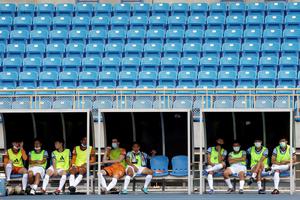Prolonged Threat of Current Account Deficit

Indonesia’s current account deficit (CAD) is estimated to widen. A series of government policies to suppress the CAD have not been running effectively. The problem is, as long as it is still open and does not show improvement, the rupiah will continue to be depressed by negative sentiments.
During the announcement of Asian Development Outlook (ADO) last week, the Asian Development Bank (ADB) also stated that the widening of Indonesia’s current account deficit by the end of this year will reach 2.6 percent of Gross Domestic Product (GDP), rising from 2.21 percent of GDP at the end of 2017. This percentage is also higher than Bank Indonesia’s projection of 2.5 percent of GDP.
The current account balance will still be in deficit as the ADB’s calculations show private investment that is heavily funded by foreign debt continues to increase. This is because the calculation of the current account balance includes transactions in goods, services, and income from production factors, such as dividends from assets, interest on loans, and money transfers from labours. The greater the ‘import of assets’, the greater the current account deficit.
Moreover, imports of capital goods will still be high, especially for the benefit of infrastructure project development. At the same time, exports will not rise significantly and instead grow slowly due to the increase of crude oil prices on the global market. The problem is the commodity prices will not experience the same good fortune.
Nevertheless, ADB assessed the current account deficit ratio is still normal because it is used for productive investment activities, which in turn have a role to drive economic growth and create jobs. “There are no reasons to be panic [due to CAD] because everything is still normal. Moreover, the government and Bank Indonesia have taken steps to reduce deficit,” ADB Indonesia Country Director Winfried Wicklein said.
When predicting the CAD will be below 3 percent of GDP at the end of the year, Bank Indonesia had hinted that the current account deficit will remain open. This changed the previous projection in last August, which predicted the CAD will still be negative at US$ 25 billion or about 2.5 percent of GDP.
However, same as Winfried, BI Governor Perry Warjiyo also believes the CAD position at the end of the year will be maintained because the government has released several policies to reduce the deficit, ranging from Pertamina’s policy to buy domestic oil lifting and mandatory B20 policy to restriction on imports through rising income tax rates (PPh) and restriction on infrastructure projects to boost the tourism sector.
However, Bank Central Asia (BCA) Economist David Sumual had a different opinion about the effectiveness of deficit reduction policies, saying the CAD would reach around 2.5 percent-3 percent of GDP in the third quarter of 2018. Although smaller than the current account deficit in the second quarter of this year, which has already exceeded 3 percent of GDP, the deficit figure is still large because there has been no significant impact from various government policies to suppress the CAD.
Currently, oil and gas deficit still affects the CAD as oil consumption reaches 1.3-1.4 million barrels per day (bpd). Oil lifting in the country is only 775,000 barrels, with Pertamina’s quota of 500,000 bpd. The remaining 275,000 bpd belongs to the private sector (contractors of oil contracts/KKKS).
So far, the allocated oil for the contractors is sold abroad. This time, the government has assigned Pertamina to buy all oil lifting allocated for contractors. For the record, the value of crude oil imports hit US$ 6.16 billion (Rp 86.24 trillion) last year. If the policy to buy oil from the contractors is implemented, then there is the potential to reduce oil imports and save foreign exchange.
However, Reforminer Institute Executive Director Komaidi Notonegoro said the sale of contractors’ oil to the Pertamina is not easy to do as it needs to amend the PSC (production sharing contract). In the current contract, the contractors have been given the freedom to sell their oil. The amendment will give Pertamina the opportunity to submit a second bid or right to match in the tender for oil purchase.
On the other hand, the B20 policy is deemed ineffective because it has not been implemented by all public fuel stations (SPBU). Therefore, oil imports are expected to remain high in the third quarter of this year due to rising crude oil prices. In fact, the price of Brent oil hit US$ 85 per barrel.
The increase in import tax rates for 1,147 consumer goods does not have a significant effect on towards decreasing consumption of exported products. The reason is that the imposition of the import tax rates only represents 5 percent of the total import value. Moreover, consumption of luxury goods is not expected to decline even though there are additional rates.
Meanwhile, the postponement of national strategic projects (PSN) is considered difficult to be implemented effectively. It is difficult to delay various PSNs that are already halfway running because banks’ interest has also begun to run. Contractors have also been bound in contracts, so they have the potential to reap controversies.
The inability to create positive sentiments from within the country through the improvement of CAD also contributed to the fall of the rupiah. On Monday (8/10), the rupiah exchange rate in the spot market had breached Rp 15,255 per USD, or fell 2.36 percent compared to the position in late September. In addition to external factors, rupiah depreciation was also influenced by domestic variables.
According to Asian Development Bank Institute (ADBI) Project Consultant Eric Sugandi, the rising of world oil prices has increased the market participants’ perception on Indonesia’s current account deficit risk, affecting the support for the country’s economic fundamentals on the rupiah. DBS economists previously analysed the rupiah exchange rate at risk of breaching Rp 16,500 per USD if the average world oil price exceeds US$ 100 per barrel next year.
BI Senior Deputy Governor Mirza Adityaswara admits developing countries having current account deficit will experience a greater fluctuation of the exchange rate depreciation. For Indonesia, this is indeed an old homework that must be finished immediately.
The rising CAD has been driven by infrastructure development programs. Thus, the import growth is actually for productive sector, but the rising CAD for whatever reason has led to a pile of net liabilities abroad and higher risk perception as time goes by. There is no other choice, the government and relevant authorities need to showcase the success of CAD control measures to investors.






